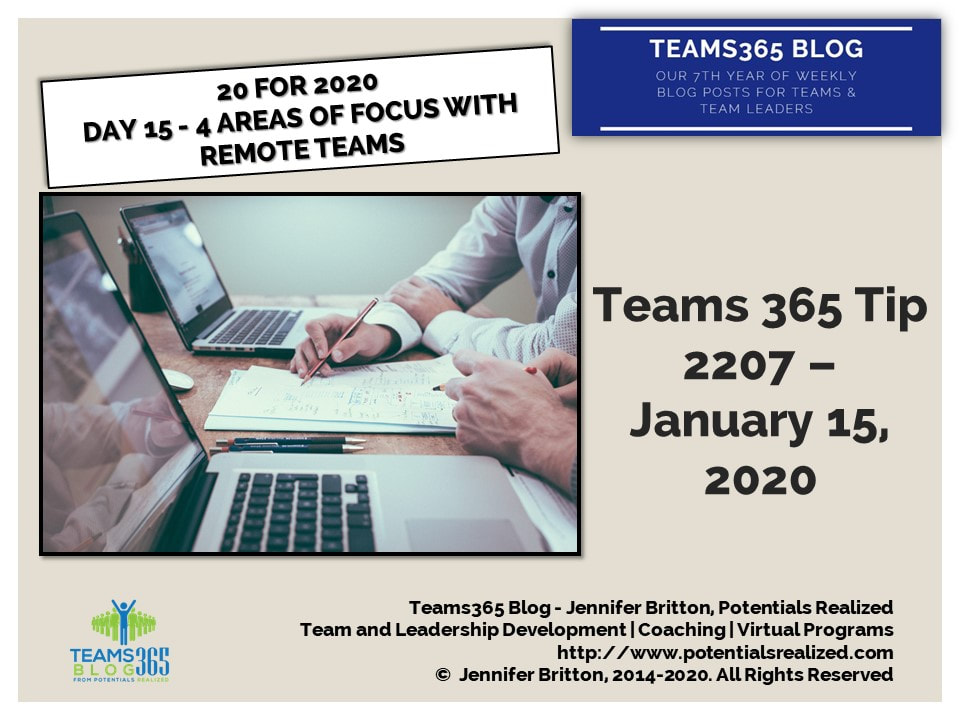1. Building everyone’s skill set and leadership capacity – In a remote team, it can be critical to equip all team members with skills and leadership capabilities even if they do not hold the title of leader. Given that remote team members may be the “face of the team or organization” or represent the organization to those locally, ensuring our team members are equipped with the right skills can make or a break an organization that is remote, or is moving remote. What are you doing to invest in team member’s development on an individual level?
2. Spending time on team development – 2016 research done by Culture Wizard found that only about 1 in 4 remote teams benefited from any team development. This is an area that is often overlooked in terms of what might be possible. At Potentials Realized, we specialize in remote team support and bring years of experience in supporting remote leadership development, virtual skill development and remote team support. Reach out to learn more about the Remote TEAM DAYS we facilitate. From half day to full day virtual sessions, to strategic planning conversations, team development in the remote space is just as important, or even more important than that in the in-person space. Team development is a blend of both focusing on results as well as building relationships.
At Potentials Realized, we offer a suite of support services specialized for remote teams – from strategic planning, to team development, to virtual training in key leadership topics (link to map of remote team topics) or our Teams365 modules. From one-hour lunch and learns to multi-day sessions we’ll meet up with you in the remote space, designing and facilitating your event, without your team having to travel (unless they want to!). Set up a call to discuss.
Questions to consider:
- What opportunities do we have this year to bring the team together (virtually or in person)?
- What opportunities could be benefit from?
- What needs attention – building our relationships, clarifying our results, or both?
- Making things explicit – All teams may falter if things are not made explicit. When assumptions go unchecked. This is particularly true in the remote space when all of us may have “different pieces of the puzzle – i.e. different contexts we operate within, different skill sets, and different vantage points on the work we are undertaking. Being proactive in sharing our context, priorities and preferences builds trust and connection, and also supports a wider understanding of priorities, practices and approaches.
More questions to consider:
- What are the things that need to be clarified?
- What needs to be shared more?
- What are the assumptions which are not being named or checked?
- What else is not being seen?
3. Proactively taking time to build relationships – In the remote space it’s hard to meet colleagues as you head into the lunchroom or head to the water cooler. We usually only come together for formal events. Given that socializing time looks different in the remote space it can be important to be more proactive in building relationships. As an organization or team, you may want to take some time to create more informal connection points. Whether this is a virtual co-working space which opens up for short windows each week, or whether it’s an informal but facilitated series of conversations at lunchtime by a colleague (think virtual lunch and learns or book club calls). Remote workers need a sense of connection and identity (stay tuned for more on this topic tomorrow).
4. Be aware of what’s below the “waterline” – In my 2019 workbook/planner PlanDoTrack, I provide the metaphor of an iceberg as a valuable tool for self-development and team development. Where teams of all kinds can benefit it by exploring what’s below the waterline of their work.
Best wishes,
Jennifer
Potentials Realized | Coaching Team Leaders | Remote Pathways Podcast
Team and Leadership Development | Coaching | Writing
Phone (416)996-8326
As we step into the start of the year, get your planning on with the PlanDoTrack Workbook and Planner or Coaching Business Builder
Looking to enhance your virtual conversations? Webinars? Pick up a copy of Effective Virtual Conversations at Amazon.
Winter 2019 programs start this week including the Coaching Biz Growth Lab (an annual focus on coaching business development), GroupCoachingEssentials (8.75 CCEs), the Advanced Group and Team Coaching Practicum (10 CCEs) and the Virtual Facilitation Essentials program (8.5 CCEs) - geared to support you in creating more exceptional virtual conversations. Finally the Mentor Coaching Group for Winter 2020 will begin - aimed at coaches who are working towards their ACC, PCC or renewing.

 RSS Feed
RSS Feed





